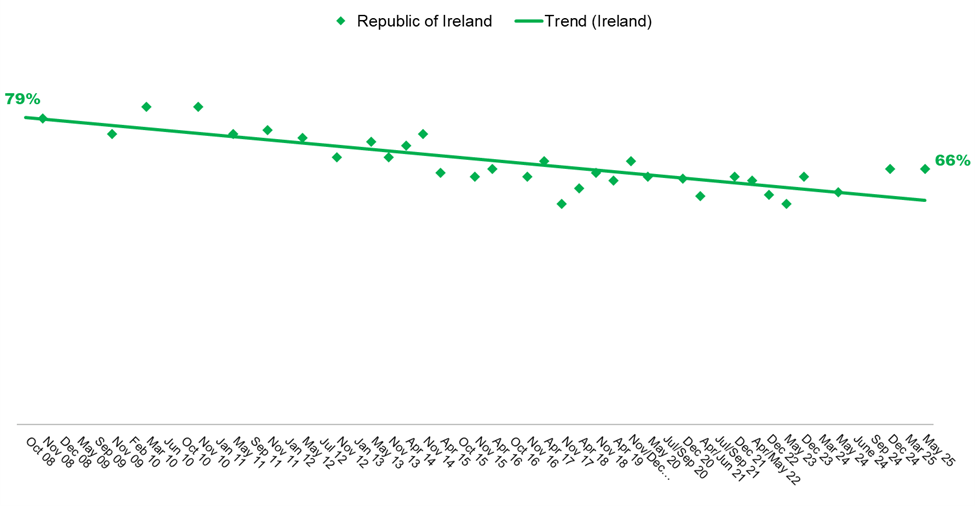Ireland’s economy has long been shaped by its openness to international markets. This openness brings many benefits – from attracting foreign investment to securing strong export performance – but it also creates vulnerabilities. In particular, Ireland’s heavy reliance on corporate tax revenue from multinational companies, the inflow of foreign investment, and its position within global supply chains mean that international policy shifts can have significant and immediate effects.
Two developments in the United States are now raising concerns for both Ireland and the global aid sector. First, the introduction of new U.S. tariffs, due to take effect on 7 August 2025, is expected to alter trading conditions between the U.S. and the European Union. Second, the closure of the United States Agency for International Development (USAID) – following substantial budget cuts earlier this year – threatens funding streams for development organisations around the world, including Irish NGOs. Together, these changes create a complex picture of potential economic and social impacts that extend well beyond Ireland’s borders.
The economic threat from U.S. tariffs
For decades, Ireland has benefited from hosting U.S. multinational corporations. Many have been drawn by the relatively low rate of corporate tax, as well as the country’s skilled workforce and access to the EU single market. These companies are not only major employers but also major contributors to the Exchequer.
The new tariffs – agreed at 15% under a US–EU deal, down from a potential 30% – still represent a notable shift in the trade environment. Even at this lower rate, they carry the risk of changing investment decisions. Some U.S. companies may choose to relocate parts of their operations back to the United States, either to avoid the tariffs altogether or to benefit from incentives linked to domestic production.
Given Ireland’s reliance on a relatively small number of large firms for a significant portion of its tax income, even a modest reduction in foreign corporate presence could have an outsized effect on public finances. Corporate tax receipts fund essential public services, meaning that a fall in revenue could create pressure for spending cuts, tax increases, or both.
The Irish Government has recognised this vulnerability and is actively seeking to diversify its trade relationships. Expanding into new markets and reducing reliance on the U.S. is a logical long-term strategy, but it is not a quick fix. In the short term, the tariff changes remain a source of uncertainty for businesses and policymakers alike.
USAID’s closure – a blow to global and Irish aid
Running alongside the trade challenges is a significant shift in U.S. foreign aid policy. Earlier this year, the Trump administration reduced USAID’s budget by 83% and announced the agency’s closure. USAID has been a major global funder of international development programmes, often working in partnership with non-governmental organisations (NGOs) in multiple countries.
For Irish NGOs, the impact is already being felt. The humanitarian agency GOAL, for example, had previously received €103 million annually from USAID. The withdrawal of this funding has forced the organisation to make thousands of redundancies and to close programmes in several countries.
The loss of USAID support comes at a time when other donor countries are also reducing their aid budgets. France, Germany, the UK and the U.S. all made cuts in 2024 – the first time in nearly three decades that this group of major donors has moved in the same direction on aid. Further reductions were announced in 2025, adding to the pressure on NGOs that rely on predictable funding to plan their work.
In contrast, Ireland has pledged to maintain its International Development budget. The Government’s stated position is that overseas aid is a long-term investment in global stability, which in turn supports Ireland’s own social and economic well-being.
Irish public opinion – support amid uncertainty
Our latest nfpPublic Ireland research shows that 45% of the public are aware of the USAID funding cuts. When asked who should fill the gap left by these cuts, responses were divided: 40% named the Irish Government, 34% the United Nations, 32% private companies and 22% individual donors.
Public giving patterns offer further insight into resilience in the face of uncertainty. Despite increasing financial pressures, Irish donors have tended to maintain their support for charities. In previous periods of economic strain – such as the COVID-19 lockdowns and the recent cost-of-living crisis – regular donors told us they would rather reduce spending in other areas before cutting charitable donations.
Our tracking data suggests that this commitment is holding firm. In May 2024, 60% of respondents reported donating in the previous three months. By December 2024 and May 2025, the figure had risen to 66%. Confidence about future giving has also remained steady, suggesting that the public’s willingness to support causes they care about is not easily shaken.

Where overseas aid charities stand
Overseas aid and development have not been a top priority cause for most Irish donors. Over the past seven years, it has consistently ranked low compared to other areas such as health, children’s causes and local community projects. However, overseas aid and development is still much more popular in Ireland than in the UK – on a per capita basis, overseas charities are far bigger in Ireland.
Nevertheless, there are grounds for cautious optimism. Individual giving levels remain stable, and government funding for international development is set to continue. This provides a platform for overseas aid and development organisations to strengthen their relationship with the public, building understanding of how their work connects to values and concerns closer to home.
The key challenge is relevance. For many donors, overseas aid can feel distant – both geographically and in terms of immediate impact. Charities in this sector may need to focus on communicating stories and evidence that bridge this gap, showing how international stability and well-being contribute to Ireland’s own security and prosperity.
If you would like to know more about the Irish public’s behaviours and attitudes toward charities, you can contact us at publicireland@nfpResearch.com.

